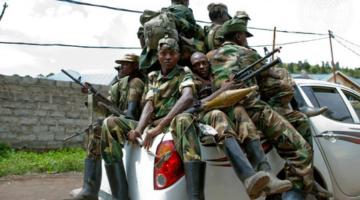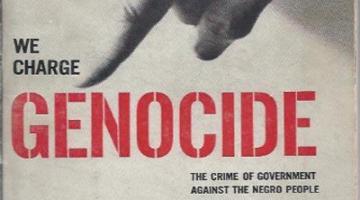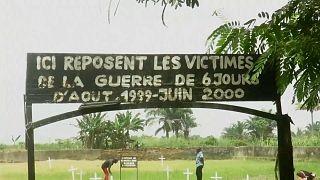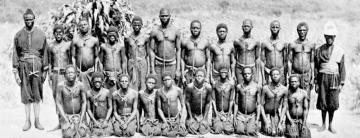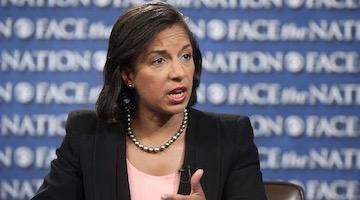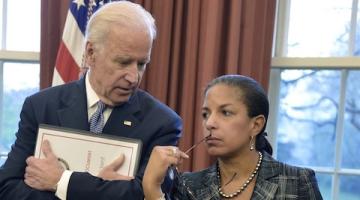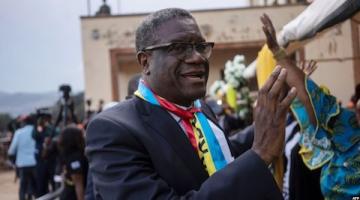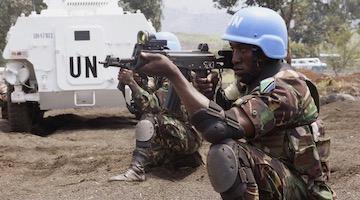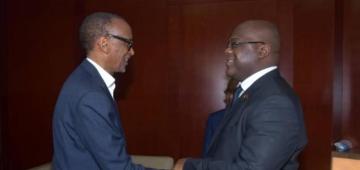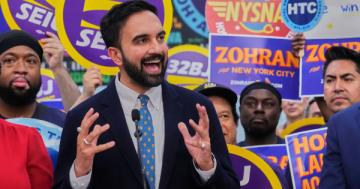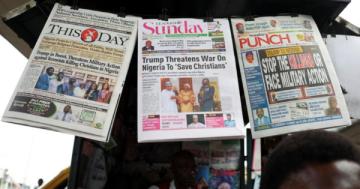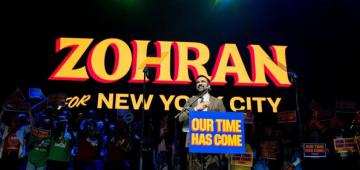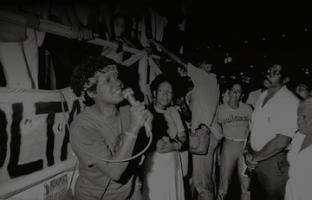“While the rest of the world celebrates their hopes for the New Year, the Congolese suffer repression and death.”
While the Black Agenda Report took a week off for the holidays, Ugandan President Yoweri Museveni ordered his army to attack Béni Territory in the Democratic Republic of Congo (DRC) two days before Christmas. Then, on New Year's Eve, Congolese President Joseph Kabila ordered his military police to attack Congolese peacefully protesting his refusal to relinquish power despite the expiration of his term in office at the end of December 2016. As of January 2, the death toll among the protesters had risen to 12, more had been wounded, and at least 120 had been arrested. I spoke to Boniface Musavuli, a native of Béni Territory, political exile in France, and author of Les Massacres de Béni and Genocide of the Congolese -- From Leopold II to Paul Kagame.
Ann Garrison: Boniface, the Congolese never seem to get a break, not even for the holidays, do they?
Boniface Musavuli: Yes, that's the case. While the rest of the world celebrates the holiday season and their hopes for the New Year, the Congolese suffer repression and death. The end of year period is not chosen at random. Most violent events in Congo occur between November and January.
AG: I’ve noted that too. Can you explain why?
BM: This period corresponds either to the great moment of international news dominated by the United States (presidential campaign and then transfer of power), or to the end-of-year celebrations. There is not a lot of media that can cover both the US presidential campaign, end-of-year celebrations, and events in an African country. In January 1961, Lumumba was assassinated during the transfer of power between Eisenhower and John Kennedy. In 1996-1997, the Congo was attacked by Rwanda and Uganda during the campaign for the re-election of Bill Clinton. In January 2001, President Laurent-Desire Kabila was assassinated during the passing of power between Bill Clinton and George Bush. At the end of 2008 and the beginning of 2009, Rwanda and Uganda attacked Congo for the third time during the Obama campaign and transfer of power.
“Troops led by Rwandan officers are attacking the people of Béni to get them out of the way of their resource trafficking networks and territorial ambitions.”
AG: We spoke a week ago when the Uganda People's Defense Force (UPDF) announced that its attack aircraft had entered Congolese air space to bomb camps of the Allied Democratic Forces (ADF) and that it was shelling the same camps with long range weapons from across the border. The UPDF then announced that they had killed 100 ADF fighters. Shouldn't that have been the end of the ADF, which the UN Group of Experts on DRC said had been reduced to 100 members by 2015?
Boniface Musavuli: The information published by the Ugandan army on the losses suffered by "alleged ADF" has not been confirmed from local sources. One must always doubt the information given by a force engaged in a conflict.
Ann Garrison: If the bombing and shelling is not hitting ADF militia members, who is it hitting? There have been a few reports of refugees crossing the Congolese border into Uganda, but no casualty reports that I can find.
BM: I think that the main objective of the Ugandan army is not to fight on Congolese soil, but rather to occupy. As I have previously explained, the "ADF" no longer exists as a military force and the "alleged ADF" are instead the excuse of some troops led by Rwandan officers who have infiltrated the Congolese army. They are attacking the people of Béni to get them out of the way of their resource trafficking networks and territorial ambitions.
Uganda can not fight against an enemy that no longer exists. On the other hand, Uganda has interests in eastern Congo and wants to protect them before the end of Joseph Kabila's reign.
“The main objective of the Ugandan army is not to fight on Congolese soil, but rather to occupy.”
AG: Uganda's New Vision seems to be the only Ugandan publication to have published a critical report—“UPDF on the spot over DR Congo mission”—and they quoted your remarks in our conversation extensively. An online publication called Actualité CD quoted Juma Balikwisha, Béni's Member of Congo’s Parliament, who, like you, accused the Ugandan army of coming to occupy, and said that Ugandan troops were on Congolese soil before the attack.
They also quoted Thomasa D'Awuin Muti, the President of North Kivu Province Civil Society, who said [translation from French]: "Until today, we know that the neighbors destabilizing our country are Rwanda and Uganda. And so, using the destabilizers to stabilize is less thoughtful. When we went to the military authorities, they told us that they were not yet informed on a plan developed between the Congolese and Ugandan army and that they were surprised to learn that the Ugandan army is conducting bombing operations. You understand that there is not even planning between the FARDC [Congolese army] and the UPDF [Ugandan army]."
“We know that the neighbors destabilizing our country are Rwanda and Uganda.”
This is one of many contradictory reports as to whether or not the Congolese and Ugandan armies have been working together against the “alleged ADF” in Beni, but maybe we shouldn't expect consistency since they claim to be attacking a ghost militia in the first place. Can you help us make any sense of this?
BM: In reality, Uganda has always held the Congolese army in low regard. The Congo under Kabila could not create an army powerful enough to stop its aggressors from the east, Rwanda, Uganda, and Burundi since 1996. The armies of these three countries, and even of Angola on Congo’s southwest border, are accustomed to penetrating Congolese national territory and then leaving without being bothered by the Congolese government. However, my information is that the Ugandan army has not yet engaged troops on the ground, and that they continue instead to amass at the border.
AG: OK, let's turn to Kabila's New Year's Eve attacks on the peaceful marchers protesting his refusal to relinquish power on New Year’s Eve. On December 30, Reuters reported that Kabila had ordered telecommunications companies to cut internet and SMS text messaging services across the country ahead of planned anti-government demonstrations. How were you able to learn about what happened next in France?
BM: Communication services have indeed been cut. What is deplorable is that the minister who ordered the cuts, Mr. Emery Okundji, is a former active member of the opposition who joined Kabila. At the time he was in opposition, he was hostile to the practice of cutting off communications for political reasons. Kabila is discrediting the entire Congolese political class. We still managed to call our contacts on the ground.
“Kabila is discrediting the entire Congolese political class.”
AG: The Catholic Church, which called for the peaceful New Year's Eve protests, is the second most powerful institution in DRC, isn't it? Second only to the army?
BM: The Catholic Church is not a political or state institution. It can not be compared to the police or the army, which are state institutions. The Catholic Church is, however, the most respected and well-established civilian institution in the country. Catholicism is Congo's first religion with 50% of believers. During the New Year’s Eve March, many priests showed extraordinary courage by walking in the front line with the people.
AG: And what is the church calling on Kabila to do? Are they backing an interim president until elections can be organized?
BM: The Catholic Church had sponsored a political agreement in December 2016 between Kabila and the opposition to allow Kabila, whose constitutional mandate had expired, to be able to organize the elections in 2017. Kabila did not respect this agreement, and everything suggests that he will never hold elections. The Catholic Church is fighting for a transitional government without Kabila.
AG: And what would you like to see happen?
BM: The idea of a transition without Kabila is the most logical. Kabila did not organize elections because he has no intention of leaving power. However, for this idea to be implemented, Kabila must somehow be removed from power. Until then the nation is at a dead end.
AG: Will anything decisive happen without the agreement of the United Nations Security Council (UNSC) and/or the US?
BM: In fact, one of the keys to the crisis lies in the hands of the United Nations, and especially the United States. Kabila and his entourage must be subjected to international sanctions until they agree to withdraw from power.
AG: And where do the UNSC and the US seem to stand now?
BM: Americans, French and several African countries have not yet agreed on the need to get rid of Kabila quickly. The emissary of President Donald Trump, UN Ambassador Nikki Haley, asked the Kabila regime to organize the elections that it failed to organize in 2017 in 2018. An electoral calendar was published providing for elections on December 23, 2018. But this date is likely to be ignored just as the December 2017 date was. And even if elections were held on that date, they would be so discredited by fraud that their results would give rise to massive challenges and a new crisis of legitimacy.
“Kabila must somehow be removed from power. Until then the nation is at a dead end.”
AG: Is there anything else you'd like to say?
BM: Congo is in a situation that requires a strong mobilization of the international community. Kabila and his followers are only concerned about one thing: to retain power. Meanwhile, social distress keeps worsening and the security situation keeps deteriorating. If nothing is done quickly, the crisis will only get further out of control.
Ann Garrison is an independent journalist based in the San Francisco Bay Area. In 2014, she received the Victoire Ingabire Umuhoza Democracy and Peace Prize for her reporting on conflict in the African Great Lakes region. She can be reached at @AnnGarrison or ann@kpfa.org.
Boniface Musavuli is a native of Beni Territory now living in political exile in France and author of the books “The Massacres of Beni” and “The Genocides of the Congolese, from Leopold II to Paul Kagame.” He can be reached at bmusavuli@gmail.com.

